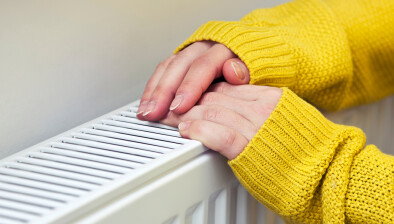Almost a third of Scottish households in fuel poverty

Fuel poverty rates in Scotland increased to 31% of all households in 2022, of which more than 18% were in extreme fuel poverty, the latest Scottish House Condition Survey has found.
Scotland’s chief statistician has today released figures on fuel poverty, energy efficiency, the condition of housing and other key descriptors of the occupied housing stock in Scotland.
The report found that 791,000 households were in fuel poverty in 2022, of which 472,000 households (18.5% of all households) were in extreme fuel poverty. This compares to 24.6% (613,000 households) in fuel poverty of which 311,000 (12.4% of all households) were in extreme fuel poverty in 2019.
The median fuel poverty gap has also increased to £1,240, a 65% increase compared to £750 in 2019. Similarly, the median fuel poverty gap (adjusted for 2015 prices) for fuel poor households in 2022 (£1,020) is higher than in 2019 (£700), a 46% increase.
In 2022, 52% of Scottish homes were rated as EPC band C or better under SAP v9.93. This is an increase of around 8 percentage points compared to 45% in 2019.
Under SAP 2009, which allows comparisons over a longer period, over half of dwellings (56%) were rated C or better, up 32 percentage points since 2010. In the same period, the proportion of properties in the lowest EPC bands (E, F or G) has reduced from 27% in 2010 to 9% in 2022.
In 2022, two new below tolerable standard criteria were introduced (assessing the presence, type, and condition smoke, heat, and carbon monoxide alarms) leading to a sharp increase to the proportion of below tolerable standard dwellings from 2% in 2019 to 29% in 2022. However, if these two criteria were not included the proportion of dwellings below tolerable standard would be 2% similar to 2019.
The Scottish Housing Quality Standard (SHQS) failure rate in the social sector was 41%, not allowing for abeyances and exemptions, This has fallen from 60% in 2010. Failures of the Energy Efficient criterion were the biggest drivers of failures overall for the social sector. In 2022, 29% of social sector properties did not meet the Energy Efficient criterion.
Disrepair to critical elements, which are central to weather-tightness, structural stability and preventing deterioration of the property, stood at 49% in 2022. Less than half of these (18% of all dwellings) required urgent disrepair to critical elements and just 3% had extensive disrepair (covering at least a fifth of the element area) to critical elements.
Overall, this is an improvement of 3 percentage points on 2019, when 52% of dwellings had disrepair to critical elements. The 2022 rate has returned to a level similar to 2016 (48%).
Lori McElroy, chair of the Existing Homes Alliance, said: “These statistics confirm what we have known for some time – the level of fuel poverty in Scotland is unacceptable and rising. We have some excellent fuel poverty programmes in Scotland including Warmer Homes Scotland and Area Based Schemes – these programmes transform lives by making homes warmer and cheaper to heat. They must now be scaled up to meet this increased need.
“Energy efficient homes are essential for reducing both fuel poverty and climate change emissions. The data from the survey shows fuel poverty in Scotland at an unacceptable level and only around half of Scottish homes (52%) have a good level of energy efficiency (EPC band C or better) - this is simply not good enough.
“Our homes and buildings account for roughly 20% of Scotland’s climate change emissions. Simply put, there is no transition to net zero for Scotland without a transition to clean heating, but it needs to happen in a way that helps people out of fuel poverty too.
“With today’s release and the consultation on the Heat in Buildings Bill proposals closing soon Holyrood must find a way to address Scotland’s desperate levels of fuel poverty at the same time as rolling out clean heating systems if we are to have a just transition to net zero by 2045.”
Debbie Horne, Scotland policy and public affairs manager at Independent Age, added: “The latest statistics released today show that over a third of older households (36%) were in fuel poverty, with 24% facing extreme fuel poverty. 55% of those in later life live in homes with an EPC rating of band D or below. This is unacceptable.
“Despite the recent Ofgem price cap announcement, energy prices are around 60% higher than in 2021. Our helpline continues to hear from older people who are forced to cut back on food, wash less and sit in cold, damp homes. It’s clear we need a step change in support.
“The UK Government must introduce a single social energy tariff to reduce the bills of people on a low income, including those in later life. It’s also vital that the Scottish Government improves the energy efficiency of the homes older people live in, including by increasing access to the Warmer Homes Scotland scheme - which provides support for energy efficiency measures worth around £10,000 - to cut the cost of keeping warm.
“The importance of a safe, warm and secure home cannot be underestimated. It is our human right. Yet today’s survey results are a stark reminder that this is not the reality for an increasing number of those in later life across the nation. This needs to change, and that will only happen with action from Westminster and Holyrood.”
Citizens Advice Scotland social justice spokesperson Matthew Lee said: “It is completely unacceptable for this many people to be living in fuel poverty in Scotland.
“Fuel poverty is a technical term that means you have to pay more than 10% of your income on energy.
“Every single day all across Scotland CAB advisers see what that technical term means for people’s lives. It means disabled people skipping warm meals to charge medical equipment.
“It means pensioners sitting in the cold and the dark because they are so scared about the cost of turning the heating on, and parents cutting back on clothes for their kids.
“Having gone through a pandemic, and the worst cost of living crisis in memory since these figures were last published, this increase may not be surprise people, but it should spark outrage and action.
“These figures more than ever underline the need to ensure we have a just transition to net zero emissions, which ensures those with the least don’t end up paying the most.
“Anyone who is worried about the energy bills and money should seek advice from the Citizens Advice network. Our advisers get real results for people, with those who saw a gain from energy advice last year over £400 better off.”
Conor Forbes, policy director for Advice Direct Scotland, said: “These latest figures show that fuel poverty in Scotland was on the rise during 2022, and since then we know that things have only got worse for struggling households.
“The UK’s energy market is broken, which is why we are calling for a social tariff that would protect the most vulnerable people from spending excessive amounts on their bills.
“The policy could be targeted at those most in need, with eligibility being determined by whether members of a household are in receipt of benefits or are on low incomes.
“The Scottish Government does not have the power to introduce a social energy tariff on its own, which is why we are calling on the Chancellor to act in his Budget next week.”








